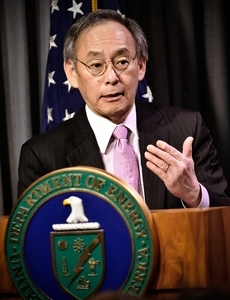Departing Energy Secretary Steven Chu’s farewell letter is not the usual five paragraphs consisting of gradiose claims and bromides for the ages. At more than 3,750 words, it is  the length of a college term paper or a magazine feature article. As interesting for what it leaves unsaid as for what it says, it says some quite interesting things about what DOE did to reduce the dangers of nuclear weapons during the Chu years:
the length of a college term paper or a magazine feature article. As interesting for what it leaves unsaid as for what it says, it says some quite interesting things about what DOE did to reduce the dangers of nuclear weapons during the Chu years:
One of those statements–the assertion that 10 percent of our electricity is being generated from uranium from former Soviet nuclear weapons–surely cannot be right. Since nuclear energy accounts for just 20 percent of U.S. electricity, Chu’s claim would imply that half our nuclear electricity is being made from Russian nuclear material. Apart from that one fact-checking lapse, Chu’s points seem sound. Not the least of them concern nuclear clean-ups, where Chu has some telling language on the subject of Hanford, Washington, where the first plutonium for U.S. atomic bombs was produced. Hanford is notoriously a festering mess; it seems, to judge from the tenor of Chu’s words, that the Department of Energy finally is knocking heads together hard and insisting progress be made:
“… [E]nvironmental clean-up projects still have considerable technical and project management challenges. As an example, the Waste Treatment and Immobilization Plant at Hanford is the most complex and largest nuclear project in history. For the past 6 months, I have been working with six extremely talented people, typically devoting 5-10 hours a week that include nights and weekends. We have also been working intimately with a restructured EM management team to overcome remaining challenges. We have invited ecologists in the State of Washington to join in our frank discussions and the DOE team is rebuilding trust that had broken down over the past decade. I am especially appreciative of Governor Gregoire for her trust and support over the past six months.”
If Chu’s personal efforts with respect to Hanford pay off in the long run, that alone will guarantee his reputation as a hard-working, innovative and problem-solving energy secretary.